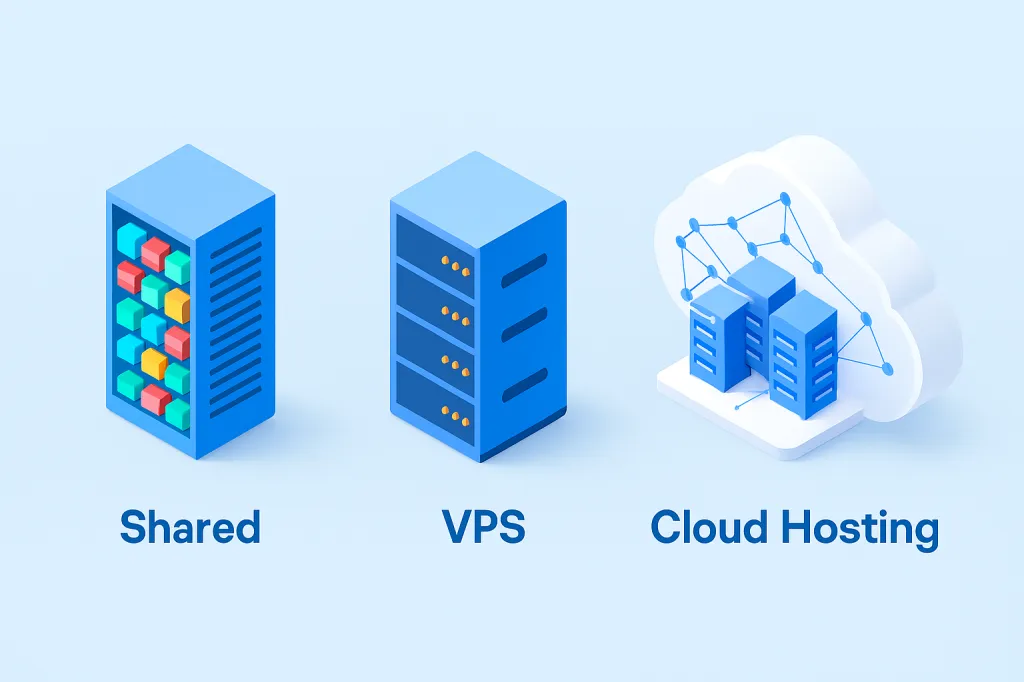Choosing your digital real estate: An introduction to web hosting
Choosing the right web hosting is one of the most critical decisions you'll make for your website. It's the foundation upon which your entire online presence is built. However, the terminology can be confusing. In this guide, we'll break down the three most common types of hosting—Shared, VPS, and Cloud—using a simple analogy to help you decide which one is right for you.
1. Shared Hosting: The Apartment Building
Shared hosting is the most popular and affordable type of web hosting. Think of it like living in an apartment building. You have your own apartment (your website), but you share the building's resources—like electricity, water, and the elevator (CPU, RAM, and disk space)—with all the other tenants (websites).
Pros:
- Extremely Affordable: It's the cheapest way to get your website online.
- Beginner-Friendly: Hosting companies manage the server, security, and maintenance for you, usually providing an easy-to-use control panel (like cPanel).
Cons:
- The "Noisy Neighbor" Effect: A sudden traffic spike on another website on the server can slow your website down.
- Limited Resources: You have a limited amount of RAM and CPU power. If your site grows, you'll quickly hit the ceiling.
- Less Secure: Since you share the server, a security vulnerability on another site could potentially affect yours.
Who is it for? Shared hosting is perfect for new websites, personal blogs, and small businesses that are just starting out and have low to moderate traffic.
2. VPS Hosting: The Townhouse
A Virtual Private Server (VPS) is the next step up. Imagine it as a townhouse. You still share the same plot of land (a physical server) with others, but your house is completely separate. You have your own dedicated resources (guaranteed RAM, CPU) that are not shared with your neighbors.
Pros:
- Guaranteed Resources: The performance of your site is not affected by other websites on the server.
- More Control: You get "root access," which allows you to install custom software and configure the server environment to your exact needs.
- Better Performance & Security: With dedicated resources and isolation, VPS hosting offers significantly better speed and security than shared hosting.
Cons:
- More Expensive: Costs are higher than shared hosting.
- Requires Technical Knowledge: You are responsible for managing and securing your server environment (unless you opt for a "Managed VPS" plan, which is more expensive).
Who is it for? Growing websites, e-commerce stores, and developers who need more power and control than shared hosting can offer.
3. Cloud Hosting: The Custom-Built, Scalable Estate
Cloud hosting is the most modern and powerful option. Instead of relying on a single physical server, your website is hosted on a network of multiple connected servers (the "cloud"). If one server has an issue, another instantly takes over. It's like having a house that can instantly expand or shrink its rooms and resources based on how many guests you have.
Pros:
- Superior Reliability & Uptime: With its redundant network, cloud hosting offers the best protection against server failure.
- Ultimate Scalability: It can handle sudden, massive traffic spikes with ease by pulling resources from the network as needed.
- Flexible Pricing: Many cloud providers offer a pay-as-you-go model, so you only pay for the resources you actually use.
Cons:
- Can Be Expensive: While flexible, the costs can be higher than VPS, especially for high-traffic sites.
- Complexity: The pricing and setup can be more complex to understand than traditional hosting models.
Who is it for? High-traffic websites, enterprise-level applications, e-commerce stores, and any site where uptime and reliability are absolutely critical.
Quick Comparison Table
| Feature | Shared Hosting | VPS Hosting | Cloud Hosting |
|---|---|---|---|
| Analogy | Apartment | Townhouse | Scalable Estate |
| Cost | Lowest | Medium | Medium to High |
| Performance | Variable | Reliable | Excellent & Reliable |
| Control | Low | High (Root Access) | High (Full Control) |
| Best For | Beginners, Blogs | Growing Businesses | High-Traffic Sites |
Conclusion: Which One is Right for You?
The best hosting for you depends on your needs and budget. If you're just starting, Shared Hosting is a great, low-cost entry point. As your site grows and needs more power, a VPS offers a perfect balance of performance and control. And if your primary needs are maximum uptime and the ability to handle any amount of traffic, Cloud Hosting is the ultimate solution. Choose the hosting that fits your needs today, but always keep your goals for tomorrow in mind.





